You’re not the only one who has ever been concerned about their cat coughing after drinking water! Cats can make a lot of different noises, and some of them even sound like they are coughing up liquid.
In this blog post, we’ll dive into why cats cough while they drink and how you can help them navigate the situation comfortably. Read on to learn more about our curious felines!
Why Does My Cat Cough After Drinking?
When cats drink a lot of water quickly, they might accidentally breathe some of the water in. This is more likely to happen when they drink from a bowl than from a moving source like a faucet or fountain.
If water gets breathed in, it can irritate their airways and make them cough involuntarily as their body tries to get rid of the extra liquid.
In some cases, cats may have an underlying respiratory condition that makes coughing more likely and should be taken seriously. If your cat is coughing frequently or having difficulty breathing, it’s important to take them to the vet for an evaluation.
Your Cat is Drinking Too Quickly
Cats cough because they are drinking too quickly. When water is being gulped down at a rapid pace, some of it can get into their airways and cause irritation. To help your cat drink more slowly, you might try changing the height or shape of the bowl.
For example, if the bowl is too low to the ground, the cat might be inclined to tilt their head back in order to drink more quickly.
You could try using a drinking fountain or water station that provides moving water. This type of water source encourages cats to drink more slowly and might help them cough less. [1]
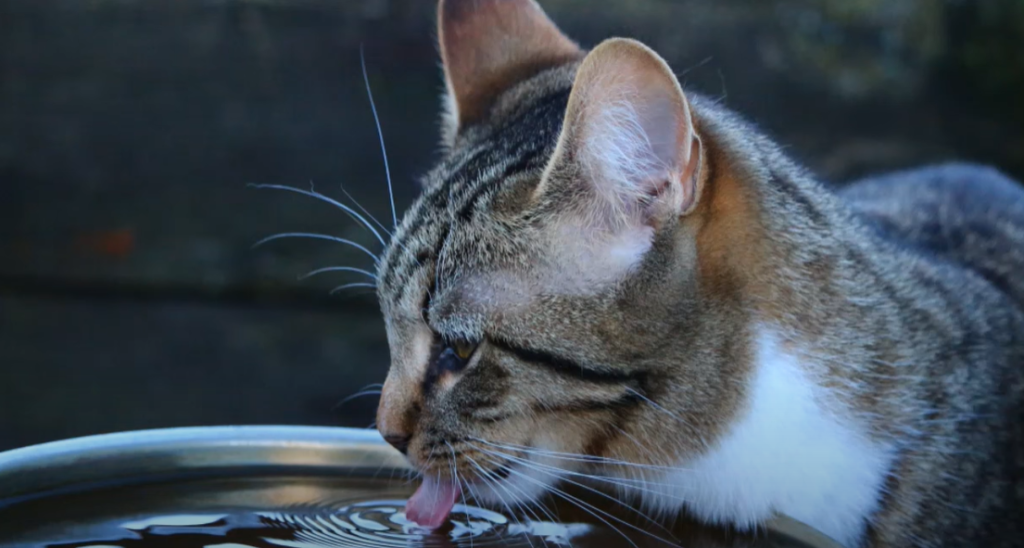
Your Cat’s Collar is Too Tight
Sometimes, a tight collar can cause cats to choke while they drink. Make sure your cat’s collar is not too tight and that there’s enough room for two fingers to fit underneath it. This will help prevent coughing as well as other respiratory issues.
The Water Tastes Bad
If your cat’s drinking water tastes or smells bad, this might be why your cat is coughing. Try changing the type of water you give your cat. Make sure that the new water is from a safe place. If your cat keeps coughing after you switch types of water, take your cat to see the vet.
Your Cat Swallowed a Foreign Object
If your cat has swallowed something that does not belong, it could be causing them to cough.
Things that do not belong can get stuck in the throat and cause irritation when your cat is drinking. If you think this might be happening, take your cat to the vet for help.
Something is Obstructing the Throat
If your cat is coughing up a lot of liquid after drinking, this could be a sign that something is obstructing their throat.
This can be very serious and needs to be taken care of immediately. If you think this might be the case, take your cat to the vet right away.
Your Cat Has Respiratory Infection
Respiratory infections can cause cats to cough and make it difficult for them to drink water. If you think your cat might have an infection, take them to the vet right away.
If your cat still has coughing issues after making these changes, take them to the vet for an evaluation. With the right care and attention, cats can stay healthy and enjoy drinking water without any coughing!
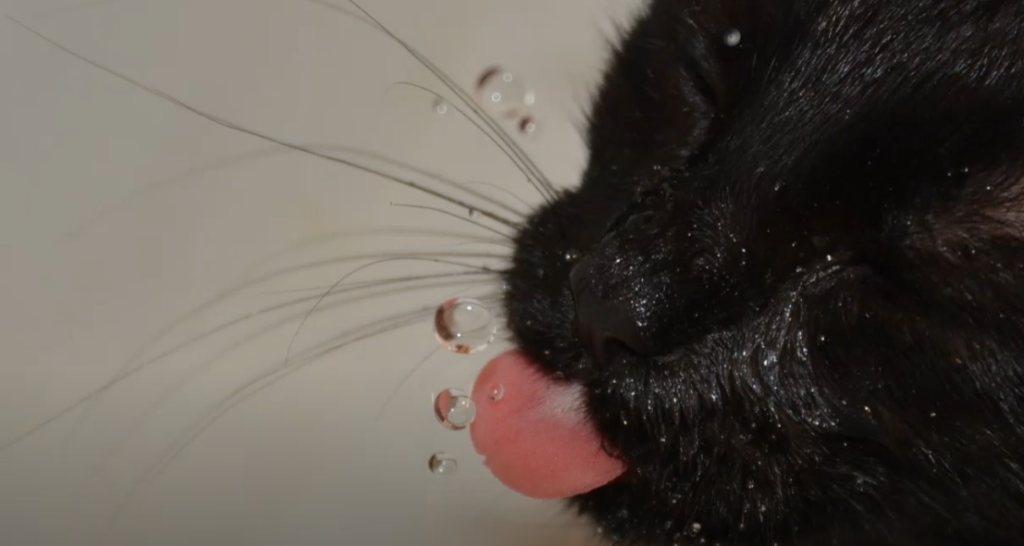
Your Cat Suffers from Allergies
If your cat has allergies, it might cough when drinking. Allergies to pet food or other things in the environment can make the throat swell and irritate the airways, which causes coughing.
If your cat is having allergic reactions, you might need to change its diet or take steps to reduce its exposure to allergens in its environment. Your vet can help you figure out what is going on and give advice on how to reduce your cat’s allergens.
How Can I Help My Cat Drink Comfortably?
If your cat is coughing after drinking, there are a few things you can do to help it. Make sure your cat always has fresh water. Check the water quality every now and then.
Make sure the cat’s collar isn’t too tight. Give the cat different types of bowls or drinking fountains that help it drink more slowly.
If all of these steps don’t help, you might need to take your cat to the vet. The vet can diagnose any underlying medical issues and provide treatments or medications to help your cat feel better.
Should I Worry That My Cat Coughs After Drinking Water?
If your cat is coughing after drinking water, it might mean there is a medical problem. If you see your cat coughing more than normal, or if the coughing does not stop after you make changes to their food and where they live, take them to the vet right away.
With good care, cats can stay healthy and have fun drinking water without coughing! If you’re worried about your cat’s health, take it to the vet to make sure everything is okay.
FAQ
Why does my cat reverse sneeze after drinking water?
Your cat might have a sore throat, something stuck in its throat, or a collar that is too tight. If your cat keeps sneezing after drinking water, you should take it to the vet.
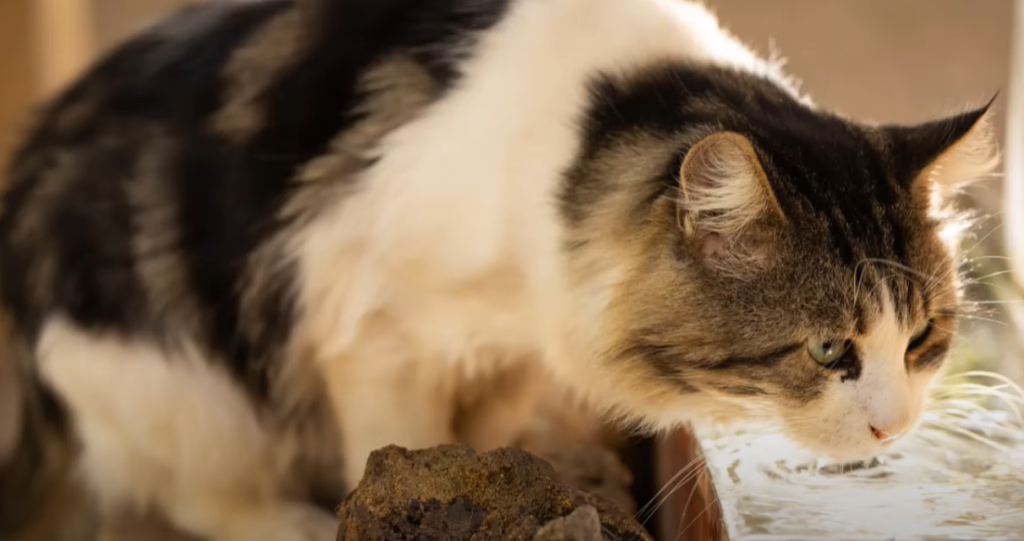
What can I do if my cat won’t stop coughing after drinking?
If your cat is coughing after drinking, make sure it has fresh water and check the quality of the water. If your cat is still having problems, you should take it to the vet for an evaluation.
The vet can diagnose any underlying medical issues and provide treatments or medications to help your cat feel better.
What to do when your cat is choking on water?
If you think your cat is choking on water, try to remove whatever is causing the blockage. If that doesn’t work, take your cat to the vet right away. The vet can help determine what is causing the problem and provide treatment if necessary.
Why do cats cough like they are choking?
There are a few reasons why your cat might cough like they’re choking. It could be because of allergies, or something being stuck in their throat. Or, it could be because their collar is too tight. If your cat keeps coughing after they drink water, take them to the vet right away.
How do I know if my cat has water in his lungs?
If your cat has trouble breathing or sounds wet or gurgly when they breathe, it might mean they have water in their lungs. If you see any of these symptoms, take your cat to the vet right away for help.
Can water get into a cat’s lungs?
Water can get into your cat’s lungs if they drink too quickly and do not swallow properly. This can happen when cats lap up water or try to drink from waterfalls or fountains too quickly.
To help prevent this, make sure your cat has fresh clean water and provide slower drinking sources like various types of bowls. If you are worried about your cat’s health, take it to the vet for a check-up.
What can I do to prevent my cat from coughing after drinking water?
To help prevent your cat from coughing after drinking, make sure it always has fresh water to drink. You can also try to provide different types of bowls that make it easier for them to drink slowly. If you are concerned about your cat’s health, take them to the vet for an evaluation.
How to tell if a cat’s coughing is serious?
If your cat starts coughing more than normal, or if the coughing does not stop after you make changes to their food or where they live, take them to see the vet right away. The vet can’t figure out if there is a medical problem and give your cat medicine or other treatments to help them feel better.
Coughing can sometimes be a sign of other serious diseases, so it is important to take your cat to see the vet as soon as possible if you notice any changes in their breathing or coughing.
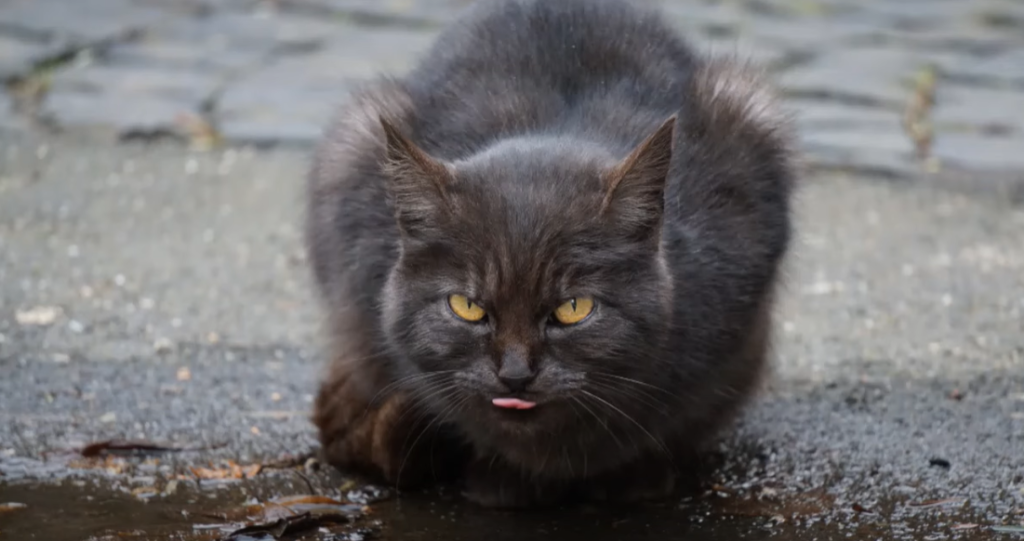
Why does my cat cough after drinking water?
There are several reasons why your cat might be coughing after drinking water. Some possible causes include allergies, a sore throat, something stuck in their throat, a collar that is too tight, or a medical condition such as asthma. If you are worried about your cat’s health, take it to the vet for an evaluation.
The vet can diagnose any underlying medical issues and provide treatments or medications to help your cat feel better.
Does cough syrup help cats with coughing?
Cough syrup is not good for cats because it can be poisonous. It is better to take your cat to the vet. The vet will figure out what is wrong and give your cat medicine to make it feel better.
In some cases, the vet may recommend that you get cough medicine from the store. But only do this after talking to the vet first.
Do cats need to drink a lot of water?
Yes, cats do need to drink a lot of water. If they don’t get enough water, they can become dehydrated. To help your cat drink more water, provide slow-flow drinking sources like various types of bowls. If your cat is not drinking enough water, take them to the vet for a check-up.
Does my cat need special water?
No, your cat does not need special water. However, make sure that the water is clean and free from bacteria. If you are concerned about the quality of the water, take it to get tested or buy bottled water for your cat.
Additionally, try to provide different types of bowls for them to drink from so they can drink slowly. Too much water too quickly can cause them to cough or choke.
Is coughing in cats normal?
If your cat starts coughing more than usual, it is not normal and you should take them to see the vet. The vet can figure out if there is a medical problem and give your cat medicine to make them feel better.
Coughing can sometimes be a sign of other serious diseases. So, if you notice any changes in your cat’s breathing or coughing, you should take them to see the vet right away.
Which cats are more likely to cough after drinking water?
All cats sometimes cough after drinking water. But younger cats and kittens are more likely to do this because their airways are still growing. They might not be able to drink from a bowl without coughing or choking.
To help prevent this, give them different types of bowls that they can drink from more slowly. If your cat is coughing more often than usual, take them to the vet for an evaluation.
Do cats usually cough a lot after drinking water?
No, it is not normal for cats to cough a lot after drinking water. If your cat starts coughing more than usual or has trouble breathing, there might be a medical problem. You should take your cat to the vet for an evaluation.
Can I give my cat cough medicine?
No, it is not safe to give your cat cough medicine without consulting a vet first. Cough syrup can be poisonous to cats and should not be given without the supervision of a professional.
The vet will figure out what is wrong and give your cat the best treatment for their condition. In some cases, they may recommend you get cough medicine from the store. But only do this after talking to the vet first.
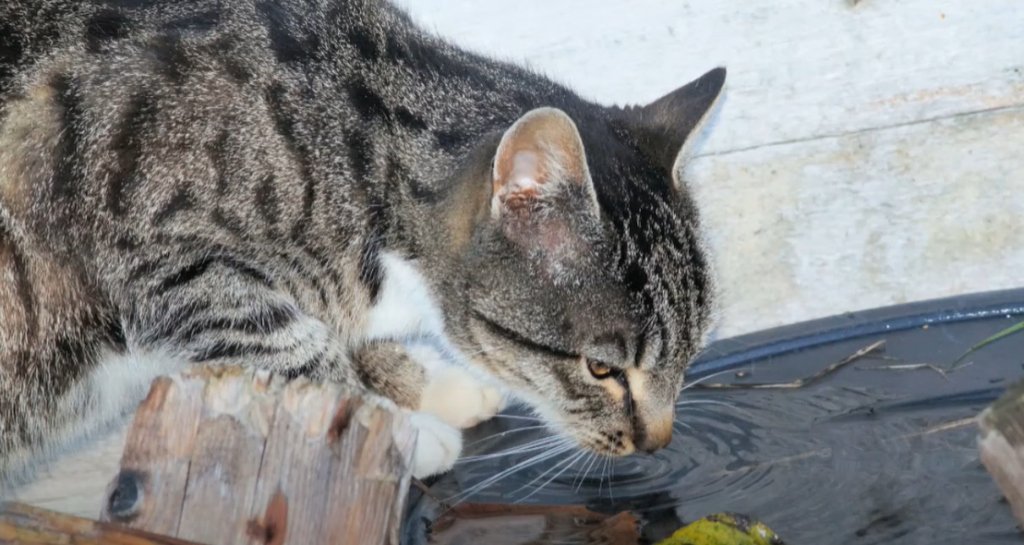
Why Does My Cat Cough After Drinking Water?
Cats can cough after drinking water due to a few different causes. The most common cause is that they are drinking too much or too quickly, which can cause them to choke or gag.
Another possible cause is that their airways are still growing, so they may not be able to drink from a bowl without coughing or choking. Additionally, coughing can also be a symptom of other medical conditions such as allergies, sore throat, something stuck in their throat, or a collar that is too tight.
If your cat starts coughing more than usual or has trouble breathing, take them to the vet for an evaluation.
Why is it important to take my cat to the vet if they are coughing?
It is important to take your cat to the vet if they are coughing. This is because coughing can sometimes be a sign of other serious diseases. The vet will figure out what is wrong and give your cat the best treatment for their condition.
Additionally, if the coughing does not stop after you make changes to their food or where they live, it is important to take them to see the vet right away. Cough syrup should not be given without the supervision of a professional and can be poisonous to cats.
How can I help my cat avoid coughing after drinking water?
You can help your cat avoid coughing after drinking water by providing different types of bowls for them to drink from. Slow-flow drinking sources like various types of bowls are best for cats because they can drink at their own pace and avoid choking or coughing.
Additionally, make sure that the water is clean and free from bacteria. If you are concerned about the quality of the water, take it to get tested or buy bottled water for your cat.
Finally, if your cat starts coughing more than usual or has trouble breathing, take them to the vet for an evaluation.
Useful Video: Can Cats Choke On Water?
Conclusion
It is important to know when your cat is coughing after drinking water. If your cat has been coughing for a couple days, you should take them to the vet. The vet will help you figure out why your cat is coughing and what you can do about it.
By remaining vigilant and proactive in addressing any unusual behaviour from your pet—such as excessive coughing—you’ll help ensure their health, safety and wellbeing for years to come.
Thank you for reading; we hope this article has helped you gain an understanding of why cats may cough after drinking water and what action you can take if deemed necessary.
References:
- https://mrbosscat.com/cat-coughs-after-drinking-water/

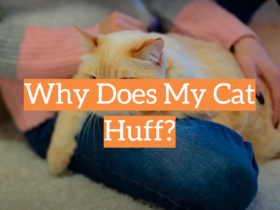
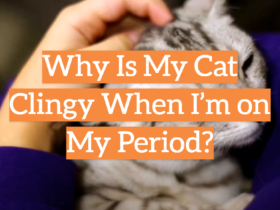

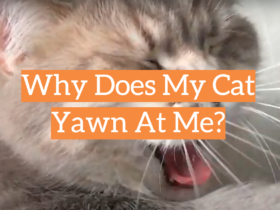
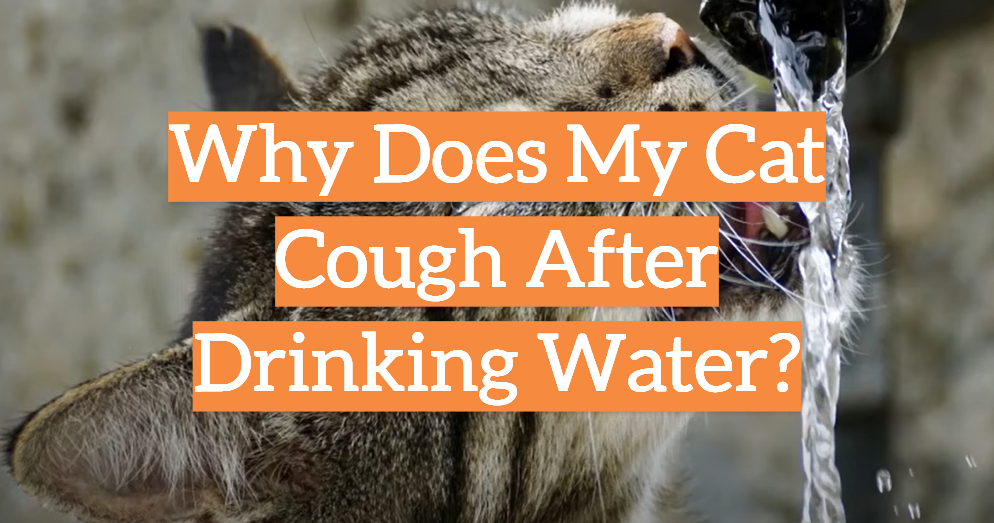
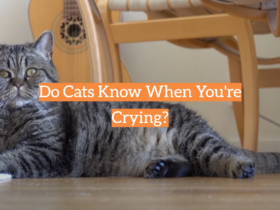

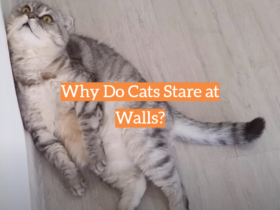
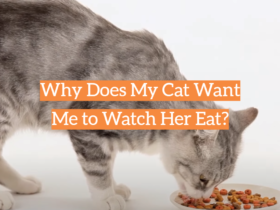
Observing my cat cough after drinking water prompted concerns, and I discovered that this behavior might be linked to hairballs. Cats groom themselves regularly, and some hair inevitably gets ingested. After a bout of drinking water, the coughing is their way of expelling hairballs. To manage this, I’ve incorporated hairball control supplements into their diet, and the coughing episodes have noticeably decreased. It’s a reminder that a seemingly simple behavior can be connected to a broader aspect of a cat’s grooming routine.
My cat’s occasional coughing post-water consumption had me puzzled until I learned it could be related to the speed at which they drink. Cats are notorious for being fast drinkers, and sometimes, they inadvertently inhale a bit of water. This can lead to a coughing fit as they clear their airways. To address this, I’ve switched to a shallow water dish and ensure it’s regularly filled to encourage slower, more controlled drinking. It’s fascinating how a simple adjustment can make a significant difference in their post-drinking coughing.
Witnessing my cat cough after drinking water sparked worry, but I discovered that it might be due to a mild sensitivity. Sometimes, the water’s temperature or the minerals in it can cause a brief irritation, leading to a coughing reflex. To address this, I’ve started using a water filter to provide cleaner water, and I’ve slightly adjusted the water’s temperature. Since making these changes, the coughing incidents have become less frequent, emphasizing the importance of paying attention to the finer details of my cat’s water source.
The mystery of my cat coughing after drinking water unraveled when I realized it could be related to their oral health. Cats can develop dental issues, and the discomfort might be more pronounced after consuming water. After a vet checkup and addressing dental concerns, the coughing episodes have diminished. It’s a reminder that seemingly unrelated behaviors can sometimes point to underlying health issues that need attention.
My cat’s post-drinking coughing habit led me to explore the possibility of hair or debris in their water bowl. Cats are meticulous groomers, and loose fur can end up in the water, causing them to cough. Regularly cleaning and refreshing their water bowl, along with using a shallow dish to minimize debris, has made a noticeable difference. It’s a small but crucial aspect of their care routine that contributes to their overall comfort and well-being.
The mystery of my cat coughing after drinking water led me down the path of investigating feline asthma. It turns out that coughing, especially after activities like drinking, can be a sign of respiratory issues. After consulting with my vet and initiating a treatment plan, including environmental changes and medication, the coughing episodes have significantly decreased. It’s a reminder that even seemingly innocuous behaviors might be indicators of underlying health conditions that require careful attention.
Witnessing my cat cough after drinking water raised concerns about potential allergies. Cats can develop sensitivities to certain elements in their environment or even in their water. Switching to a hypoallergenic water brand and monitoring their reactions has been beneficial. The reduction in post-drinking coughing suggests that understanding and addressing possible allergens can contribute to a healthier drinking experience for my cat.
The habit of my cat coughing after drinking water puzzled me until I considered the possibility of a throat issue. Cats, like humans, can experience throat irritation, leading to coughing. To alleviate this, I’ve incorporated wet food into their diet to provide additional moisture, contributing to throat comfort. It’s interesting how a small dietary adjustment can positively impact a seemingly unrelated behavior.
Exploring the reasons behind my cat’s coughing after water consumption led me to examine the water’s temperature. Some cats are sensitive to cold water, and drinking it rapidly might cause a coughing reflex. To cater to their preferences, I’ve started offering room temperature water. Since making this adjustment, the post-drinking coughing incidents have become less frequent, highlighting the importance of considering the sensory preferences of my cat.
The possibility of my cat coughing after drinking water being linked to hairballs didn’t initially cross my mind until I noticed a pattern. It turns out that the swift intake of water can stimulate the digestive tract, facilitating the passage of hair through the system. Incorporating hairball prevention treats into their routine has proven effective in minimizing post-drinking coughing. It’s a practical solution that addresses a common feline behavior, showcasing the importance of understanding the unique aspects of cat physiology.
My cat’s post-drinking coughing episodes became a head-scratcher until I considered the potential influence of stress. Cats can be sensitive to changes in their environment, and stress might manifest in unexpected ways, including coughing. By creating designated quiet spaces and minimizing disruptions during their drinking times, I’ve noticed a significant reduction in coughing. It’s a reminder that a calm environment contributes not only to their mental well-being but also to their physical comfort.
The mystery of my cat coughing after water intake led me to investigate the possibility of an esophageal issue. Cats, like any animals, can develop conditions affecting their esophagus, leading to coughing or discomfort. After a vet examination and adjusting their feeding routine to include smaller, more frequent meals, the coughing has subsided. It emphasizes the importance of considering not just what they consume but also how they consume it in managing certain behaviors.
Witnessing my cat coughing after drinking water made me consider the potential influence of hair spray or cleaning products in the air. Cats are highly sensitive to odors, and inhaling certain scents can trigger coughing. After switching to pet-safe cleaning products and being mindful of aerosols, the coughing occurrences have reduced. It’s a small lifestyle change that has had a positive impact on my cat’s respiratory comfort.
Exploring the reasons behind my cat’s coughing after water revealed a surprising connection to the water bowl’s material. Some cats can be sensitive to certain plastics or metals, leading to irritation. Switching to a ceramic water bowl has resulted in a noticeable improvement, and the coughing fits have become infrequent. It underscores the importance of considering not just the water quality but also the vessel from which they drink.
The possibility of my cat coughing after drinking water being related to a hair trigger gag reflex prompted me to experiment with different water bowl designs. Opting for a wider, shallower bowl has allowed my cat to drink more slowly and comfortably, reducing the instances of coughing. It’s a practical solution that takes into account their unique anatomy and showcases the impact of simple environmental adjustments on their well-being.